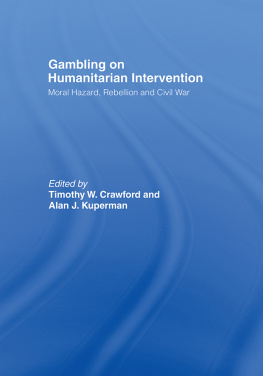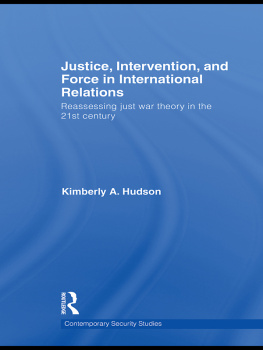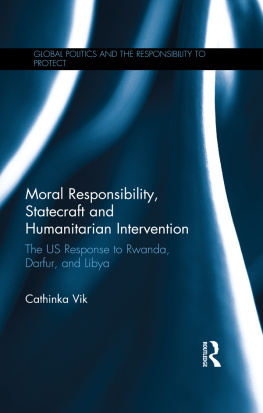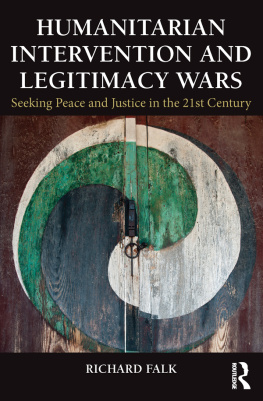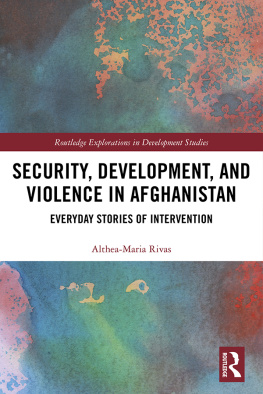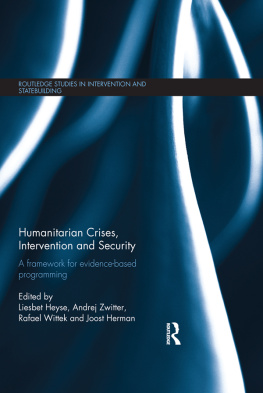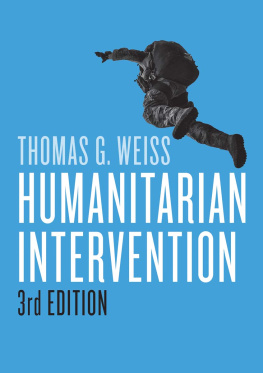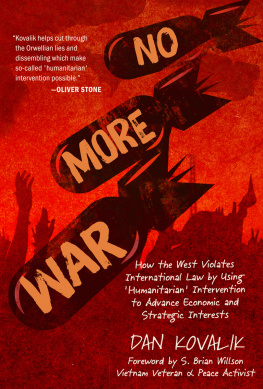Gambling on Humanitarian Intervention
Does humanitarian military intervention save lives as intended? Or does it perversely embolden rebels and ignite the spiral of violence that it seeks to prevent?
Such questions lie at the heart of a new and lively controversy in international politics. Gambling on Humanitarian Intervention explores whether the emerging norm of intervention backfires in conflicts such as Kosovo, exacerbating the ethnic cleansing and killing of innocent civilians. Leading academics investigate this problem, including when and where it is most likely to occur, and how to avert the unintended consequences without abandoning intervention. Sceptics weigh in as well, pointing out potential errors in blaming intervention for civil violence, and offering alternative explanations. Several authors conclude with prescriptions to ensure that future interventions mitigate violence as intended, rather than tragically worsening it.
This book was previously published as a special issue of Ethnopolitics.
Alan J. Kuperman is assistant professor at the LBJ School of Public Affairs, University of Texas at Austin. He was formerly resident assistant professor of international relations, and director of the international relations program, at Johns Hopkins University's School of Advanced International Studies (SAIS) in Bologna, Italy. He has received fellowships from Harvard University, MIT, the University of Southern California, the U.S. Institute of Peace, the Brookings Institution, and the Institute for the Study of World Politics.
Timothy W. Crawford is assistant professor of political science at Boston College. He has held fellowships at the Brookings Institution, Princetons Center of International Studies, and Harvards Center for International Affairs. He is a term-member of the Council on Foreign Relations, a faculty associate of the Olin Institute of Strategic Studies, and a member of the board of directors of America Abroad Media.
Gambling on Humanitarian Intervention
Moral Hazard, Rebellion and Civil War
Edited by Timothy W. Crawford and Alan J. Kuperman
First published 2006 by Routledge
2 Park Square, Milton Park, Abingdon, Oxon, 0X14 4RN
Simultaneously published in the USA and Canada by Routledge
270 Madison Ave, New York NY 10016
Routledge is an imprint of the Taylor & Francis Group
Transferred to Digital Printing 2008
2006 Taylor & Francis Ltd
All rights reserved. No part of this book may be reprinted or reproduced or utilised in any form or by any electronic, mechanical, or other means, now known or hereafter invented, including photo-copying and recording, or in any information storage or retrieval system, without permission in writing from the publishers.
British Library Cataloguing in Publication Data
A catalogue record for this book is available from the British Library
Library of Congress Cataloging in Publication Data
A catalog record for this book has been requested
ISBN10: 0-415-46374-2 (pbk)
ISBN10: 0-415-37946-6 (hbk)
ISBN13: 978-0-415-46374-4 (pbk)
ISBN13: 978-0-415-37946-5 (hbk)
Publishers Note
The publisher has gone to great lengths to ensure the quality of this reprint but points out that some imperfections in the original may be apparent
Timothy W. Crawford, & Alan J. Kuperman
The concept of moral hazard invites controversy because it appears to impugn the motives and character of seemingly innocent victims. It argues that, when people are protected by insurance, some of them will behave fraudulently or irresponsibly, becoming victims because of the resulting insurance payout. The controversy only intensifies when this logic is carried over to humanitarian military intervention, which can be seen as a type of insurance policy to protect sub-state groups from genocide and ethnic cleansing. The implication is that some groups engage in risky rebellions because they expect to benefit from international intervention if the state retaliates. In short, rebels provoke genocidal retaliation against their own group because of the expectation of humanitarian intervention.
This volume explores that controversial thesis by engaging several debates: the definition of moral hazard in the context of intervention; the theorys theoretical novelty and ability to describe and explain dynamics of internal conflict; its empirical record in recent cases of genocidal violence; and the policy implications for reforming the conduct of humanitarian intervention.
Debate starts with semantics because moral hazard actually encompasses two different, though related, dynamics. The first occurs when over-insurance causes the insured to behave fraudulentlye.g. burning down ones house because the insurance pays more than the houses value. The second occurs when any insurance (not necessarily over-insurance) causes the insured to behave irresponsibly because it is not worth the effort to behave responsiblye.g. parking ones car on the street rather than paying for a more secure garage because the car is fully ensured against vandalism. The original definition of moral hazard, which is still reflected in common usage, includes both dynamics. But some economists, and Robert Rauchhaus in his rational-choice contribution to this volume, insist that only the latter dynamic is moral hazard, whereas the former is a problem of inappropriate contracting. The distinction is interesting but, as another rationalist Harrison Wagner notes in his contribution, it is the former problem that is usually meant by the moral hazard of humanitarian intervention. He explains that vulnerable groups are unlikely to rebel if they expect intervention merely to cut the cost of failed rebellion. But they are more likely to rebel if they expect state retaliation to trigger a level of intervention on their behalf sufficient to enable achievement of otherwise unattainable political goals. As he puts it, Calls for humanitarian military intervention are demands that outsiders participate in the renegotiation of the contracts that define a state.
Even if we accept this broader meaning of moral hazard, there remains a second definitional matter. Namely, if the prospect of intervention leads some groups to rebel and thereby provoke state retaliation, must that provocation be intentional? In other words, does the perception of over-insurance lead groups to behave fraudulently or only recklessly? As Alan Kuperman observes, most dictionary definitions of provoke do not require intentionality, which matches his contention that the prospect of intervention can lead groups either intentionally to provoke or merely to run a high risk of provoking retaliation. (Interestingly, the distinctiveness of the latter definition evaporates as the risk approaches 100%.) This debate on intentionality is exemplified by the volumes opposing views of Bosnias 1992 secession from Yugoslavia. Jon Western insists the republics decision to declare independence was not intended to provoke the Serbs and thus did not arise from moral hazard. Kuperman, however, contends that Bosnias Muslims consciously refrained from declaring the independence that would trigger war until receiving promises of international recognition, because they thought such recognition carried a guarantee of protection; thus moral hazard is indeed to blame. More generally, Timothy Crawford says that in order to blame moral hazard a rebellion must be both a perverse and unintendedthough not necessarily unanticipatedconsequence of intervention. Thus he implicates moral hazard whenever intervenors did not aim for or want rebellion, even if they anticipated it as a side-effect of their intervention. By contrast, Arman Grigorian and Rauchhaus argue that, if intervenors persist after realizing they are inciting rebellion, then moral hazard cannot be blamed.

